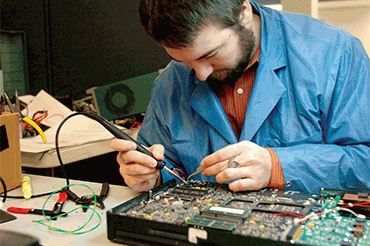Computer Engineering MS
Shanchieh Jay Yang, Department Head
(585) 475-2987, jay.yang@rit.edu
Dhireesha Kudithipudi, Graduate Coordinator
(585) 475-5085, dxkeec@rit.edu
http://www.rit.edu/kgcoe/area-of-study/ms-computer-engineering

Program overview
The master of science degree in computer engineering provides students with a high level of specialized knowledge in computer engineering, strengthening their ability to successfully formulate solutions to current technical problems, and offers a significant independent learning experience in preparation for further graduate study or for continuing professional development at the leading edge of the discipline. The program accommodates applicants with undergraduate degrees in computer engineering or related programs such as electrical engineering or computer science. (Some additional bridge courses may be required for applicants from undergraduate degrees outside of computer engineering.

Plan of study
The degree requires 30 semester credit hours and includes Analytical Topics (CMPE-610), two flexible core courses, four graduate electives, two semesters of graduate seminar, and the option of completing either thesis research or a graduate project. The core courses and graduate electives provide breadth and depth of knowledge. The Computer Engineering Graduate Seminar (CMPE-795) provides students with exposure to a variety of topics presented by researchers from within RIT, industry, other universities and guides students to choose either a thesis or project as their culminating experience.
Students who pursue the thesis option take nine semester credit hours of thesis research to obtain a culminating experience in technology innovation and discovery. Students conduct research to answer a fundamental science/engineering question that contributes to new knowledge in the field. Research findings should be repeatable and generalizable, with sufficient quality to make them publishable in technical conferences and/or journals.
Students who pursue the project option take six semester credits of graduate electives related to theri project focus and three semester credits of Graduate Project (CMPE-791) to obtain a culminating experience in product development and management. Students in the project option must register for specialized courses that are directly related to their project and professionally execute the project under the supervision of a faculty adviser. The project generally addresses an immediate and practical problem, a scholarly undertaking that can have tangible outcomes, where students are expected to give a presentation or demonstration of the final deliverables of the project.
Research tracks/Graduate electives
Students may select four graduate electives from within the following research tracks. Students are encouraged to choose most of their graduate electives within a single research track. At least two of the electives must be from the computer engineering department (computer engineering department courses begin with the prefix CMPE). Courses outside the lists below may be considered with approval from the department of computer engineering. Research tracks are available in the following areas
Computer architecture
Computer architecture deals with hardware resource management, instruction set architectures and their close connection with the underlying hardware, and the interconnection and COMMUNICATION of those hardware components. Some of the current computer architecture challenges that are being tackled in the computer engineering department include energy efficient architectures, high performance architectures, graphic processing units (GPUs), reconfigurable hardware, chip multiprocessors, and Networks-on-Chips.
Computer vision and machine intelligence
Visual information is ubiquitous and ever more important for applications such as robotics, health care, human-computer interaction, biometrics, surveillance, games, entertainment, transportation, and commerce. Computer vision focuses on extracting information from image and video data for modeling, interpretation, detection, tracking, and recognition. Machine intelligence methods deal with human-machine interaction, artificial intelligence, agent reasoning, and robotics. Algorithm development for these areas spans image processing, pattern recognition, and machine learning, and is intimately related to system design and hardware implementations.
Integrated circuits and systems
Modern processors demand high computational density, small form factors, and low energy dissipation with extremely high performance demands. This is enabled by the nanoscale and heterogeneous integration of transistors and other emerging devices at the massive-scale. Such nanocomputers open unimaginable opportunities as well as challenges to computer engineers. This research focuses on designing computers with emerging novel technologies in the presence of severe physical constraints; investigating dynamic reconfigurability to exploit the power of nano-scale electronics for building reliable computing systems; and studying the applicability of emerging technologies to address challenges in computing hardware of the future.
Networks and security
The prevalence of interconnected computing, sensing, and actuating devices have transformed our way of life. Ubiquitous access to data using/from these devices with reliable performance as well as security assurance presents exciting challenges for engineers and scientists. Resilient to environmental uncertainty, system failures, and cyber attacks requires advances in hardware, software, and networking techniques. The research track in networks and security focuses on intelligent wireless and sensor networks, cryptographic engineering, and predictive cyber situation awareness.





No comments:
Write comments